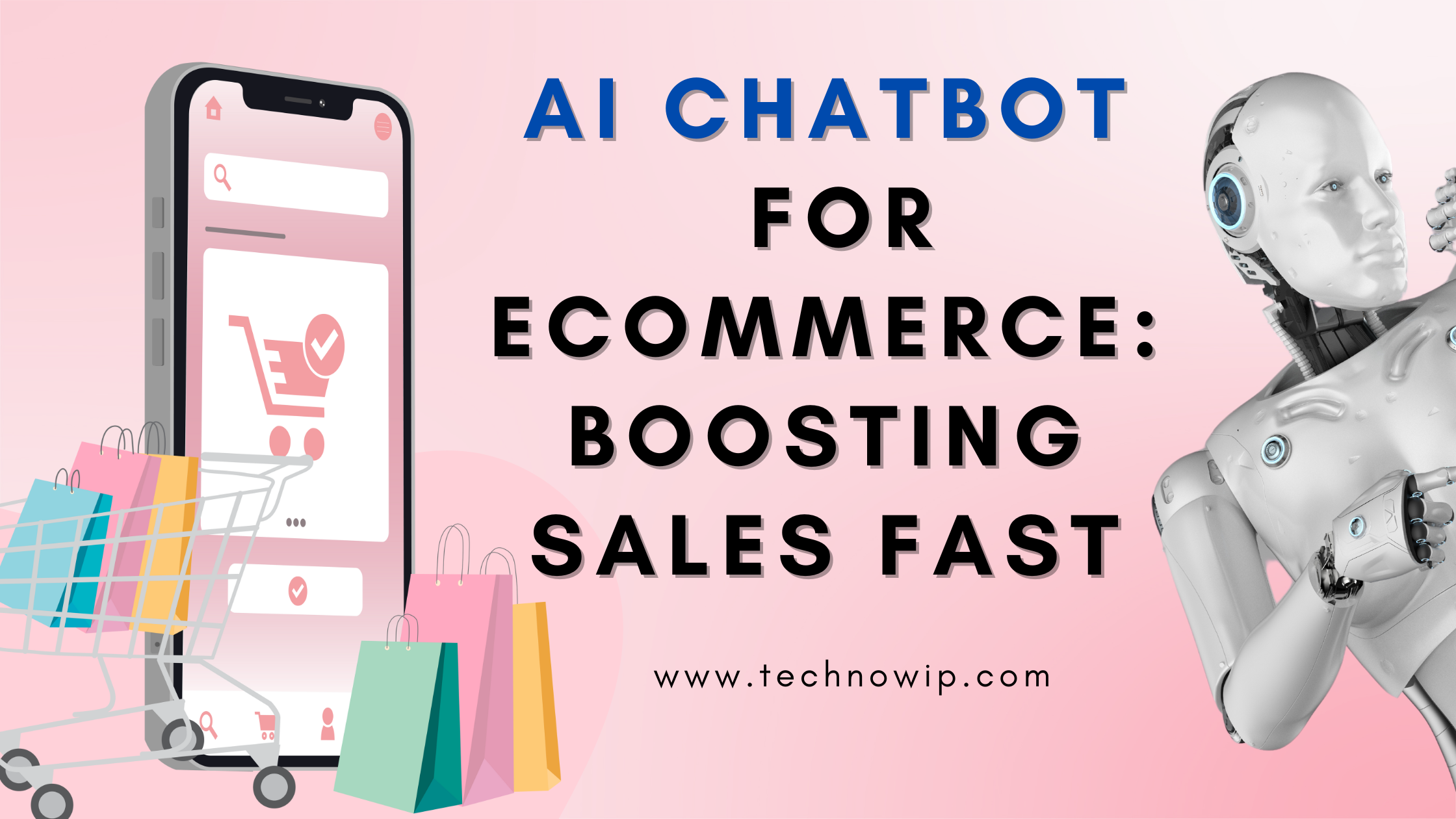Introduction
Ecommerce has transformed how customers shop, making it simpler than ever for customers to browse products and purchase them online. As eCommerce has expanded so dramatically, customer demand for instantaneous support services has skyrocketed; as businesses look for solutions that meet these expectations they increasingly turn to AI-powered chatbots in order to fulfill this role effectively. Implementing an AI chatbot for eCommerce businesses can quickly boost sales by offering personalized and real-time customer service, optimizing the sales funnel, and streamlining overall shopping experiences.

Problem: Missed Opportunities and Frustrated Customers
Online shopping can be challenging. Customers frequently experience long waiting times for responses, difficulty in navigating websites, or confusion over product details that ultimately results in lost sales opportunities and negatively impacts customer satisfaction. Here’s why:
Delayed Customer Responses
- Researchers have revealed that 57% of customers drop out when they do not get timely responses to their inquiries; slow response time being an impediment that results in lost revenues for businesses.
- Traditional customer service systems sometimes struggle to offer 24-hour assistance during high-demand periods or global operations that serve customers across different time zones.
Complex Navigation and Overloaded Product Catalogs
- In 2022, 30% of customers reported leaving an eCommerce website because they couldn’t locate what they were searching for.
- Product catalogs with hundreds or even thousands of items can quickly overwhelm customers without an effective search function and personalized recommendations in place.
Personally, I think the ability of AI chatbot for eCommerce to offer personalized product suggestions is amazing. It’s like having a personal shopping assistant which makes an enormous impactful difference for customer experience and satisfaction.
- Low Conversion Rates
- Unfortunately, eCommerce websites experience low conversion rates despite high traffic levels. Global conversion rates average at only 2.17% according to recent studies – meaning most visitors leave without making purchases.
- Many visitors leave carts unfinished due to confusion, limited personalized interaction or concerns unaddressed during the decision-making process.
- Limited Upselling and Cross-Selling Opportunities
- Upselling and cross-selling opportunities may go unrealized without timely product recommendations that engage customers immediately and timely relevant engagement strategies to drive upselling growth. While proven strategies exist that increase average order values significantly, their implementation requires fast response time from customer care staff and instantaneous engagement from clients.
AI chatbots have proven invaluable when it comes to increasing sales. By quickly answering customer questions and engaging them more deeply with products quickly, these bots help ensure less cart abandonment.
Agitation: Impact of Poor Customer Engagement on Sales
Problematic customer engagement affects not just sales but the entire customer experience as a whole, leading to disgruntled customers, lost revenues, and an irreparably damaged brand name – with lasting consequences such as lost business opportunities. The adverse repercussions can be considerable: customers become disgruntled; revenue drops due to lost sales opportunities; brand credibility suffers. These effects may be felt profoundly.
- Cart Abandonment Rates Soar
- Global shopping cart abandonment rates hover at approximately 70%, one key cause being lack of instant support during crucial moments in a buyer’s journey. Customers experiencing difficulties or doubts are more likely to leave without making purchases than those without problems encounter.
- Increased Bounce Rates
- When customers visit an eCommerce site and do not find relevant information or assistance, they tend to leave. Sites with no immediate customer support see higher bounce rates because there’s no one to guide the customer or resolve their queries in real-time.
- Customer Retention Drops
- Customer Retention Plods Its In an environment as competitive as eCommerce, customer retention is of critical importance. Poor service or confusing purchasing experiences leave an adverse impression that makes customers less likely to return – creating an expensive problem in terms of repeat purchases and cost of new customer acquisition.
- Missed Opportunities for Personalization
- Customers today demand personalized shopping experiences. According to research by Epsilon, 80% of consumers are more likely to make purchases when brands provide customized experiences; without AI chatbots it becomes almost impossible for eCommerce stores to keep pace.
I have always held that instant customer support can make or break an online store, with customers typically leaving when they feel neglected. Here AI chatbots come into their own.

Solution: AI Chatbot for ECommerce
AI chatbots offer an effective solution for these issues. Let’s examine their functionality, benefits they bring and real-life examples that demonstrate how these bots have increased sales quickly.
1. 24/7 Real-Time Customer Support
AI chatbots ensure customers always receive fast, accurate responses no matter the time or day. Essential in eCommerce where customers may shop from different time zones or expect answers at odd hours.
- Impact on Sales:
- Businesses employing AI chatbots have reported up to 30% increase in sales by guaranteeing no customer inquiry is unanswered no matter when or where it comes in.
- Case Study: Clothing retailer H&M implemented an intelligent chatbot to guide its online customers more seamlessly through its large store. The bot handled basic inquiries, tracked orders, provided product recommendations 24/7 and reduced cart abandonment by 15% while increasing conversions by 15%.
2. Faster Response Times
AI chatbots respond instantly to customer questions, significantly improving customer engagement by eliminating wait-times associated with email responses or live agents being available for contact. They eliminate this frustration completely!
- Impact on Sales:
- Levi’s implemented an AI-powered virtual assistant on its website, leading to 20% faster query resolution time and an uptick in sales. Customers received real-time answers about product sizing, material composition and shipping policies – alleviating doubts that could otherwise lead to abandoned purchases.
My experience when shopping online makes it important that I can quickly receive answers without having to wait around for someone with more personal answers, which is why AI chatbots should be considered essential tools by eCommerce stores that seek to keep customers satisfied.
3. Personalized Product Recommendations
AI chatbots can leverage customer behavior analysis, past purchases and preferences to provide personalized product suggestions and increase chances of purchase while creating upselling and cross-selling opportunities.
- Impact on Sales:
- Research by Salesforce shows that personalized recommendations account for 26% of revenue generated online via eCommerce stores despite only making up 7% of visits. AI chatbots can monitor user behavior real time to suggest relevant products at key times during each session.
- Case Study: Sephora’s AI chatbot engages customers by making tailored product suggestions based on skin tone, type and preferences for customers; this led to a 10% increase in average order value with more repeat buyers as a result.
4. Streamlined Checkout Process
AI chatbots can assist users through the checkout process and minimize friction that often leads to cart abandonment. AI bots can assist users by inputting payment details, providing delivery info and solving last minute concerns that arise in real-time.
- Impact on Sales:
- Shopify discovered that stores utilizing chatbot technology for checkout assistance saw 13% more transactions complete within just 24 hours than those who didn’t utilize this resource, as users could immediately address issues without leaving the website.

5. Addressing Customer Concerns Instantly
AI chatbots can address common customer inquiries like shipping fees, product availability and return policies without human interaction – helping businesses retain customers who might otherwise leave due to unanswered queries. This enables the chatbot to help retain more customers over time than might otherwise leave due to confusion.
- Impact on Sales:
- Businesses using AI chatbots to address common customer issues have experienced an average 40% reduction in cart abandonment.
- Case Study: Electronics giant Samsung implemented an AI chatbot to assist its customers with technical inquiries and post-purchase support, effectively decreasing return rates while driving repeat purchases through immediate assistance. The bot contributed greatly in increasing repeat purchases as a result.
6. Automating Upselling and Cross-Selling
AI chatbots can identify opportunities for upselling and cross-selling, suggesting complementary products, upgrades or related items based on customer selections.
- Impact on Sales:
- According to Forrester Research, companies employing AI-powered upselling techniques have reported 10-11% increases in order values by using them.
- Case Study: Amazon‘s chatbot provides customers with useful product recommendations when adding items to their cart, contributing to a 35% boost in annual revenues as a result of this simple AI-powered tactic.
7. Better Engagement with New and Existing Customers
AI chatbots engage customers both proactively and reactively.
Welcome new visitors, assist them with navigation through categories and keep their interest by asking relevant questions.
Returning customers are treated differently. The bot remembers their preferences and provides tailored offers.
- Impact on Sales:
- Gartner reports that businesses engaging customers through AI chatbots will experience up to 25% increased retention rates.
- Case Study: Domino’s Pizza launched an AI chatbot that allows customers to order via Facebook Messenger, leading to a 20% increase in customer retention and repeat purchases. This personalized experience saw repeat orders increase significantly by over 51%!
The Future of AI Chatbots in eCommerce
Technology is revolutionizing eCommerce, and AI chatbots are leading this charge. As they evolve further, AI chatbots will further advance personalization capabilities as well as predictive analytics and natural language processing functions allowing businesses to develop relationships with customers that create lasting interactions between customer interactions.
I would definitely invest in an AI chatbot if I were running an online store; they help facilitate an easier shopping experience, leading to faster sales growth.
How to Implement an AI Chatbot in Your eCommerce Store
Establishing AI chatbots doesn’t need to be complex – follow these three simple steps and increase sales quickly:
- Choose the Right Platform:
- Popular platforms such as Tidio, Intercom and Zendesk all provide pre-built chatbot solutions which are simple to integrate into an eCommerce store.
- Define Key Use Cases:
- Define areas in which an AI chatbot will have the greatest impact, such as customer support, product recommendations or checkout assistance.
- Set Clear Objectives:
- Set clear KPIs that measure conversion rate increases, reduced cart abandonments or increasing upsell opportunities.
- Test and Optimize:
- Monitor the performance of your chatbot while continuously optimizing its responses and capabilities so it helps customers while driving sales.
- Start Small and Scale:
- Begin using your chatbot for simple tasks like answering FAQs, then add additional capabilities as more data and insights become available to you.
AI chatbots not only save customers time but businesses too. Freeing up resources that can then be allocated toward improving products or marketing initiatives.

How do I choose the right AI chatbot platform for my eCommerce business?
- Verify seamless integration of your store.
- Make sure that the customizing options suit your specific requirements.
- Verify multi-channel support.
- Compare pricing plans.
- Read user reviews from similar businesses..
What are some common challenges in implementing AI chatbots?
- Understanding complex customer inquiries.
- Integrate seamlessly into existing systems.
- Balancing automation and human support.
- Staying current with product data.
- Management of initial setup costs.
Can you provide more case studies on successful AI chatbot implementations?
- H&M: Increased sales through product recommendations.
- Sephora offers customized skin care recommendations designed to increase satisfaction with their service and product offering.
- Levi’s: Quicker responses lead to increased conversions.
- Domino’s: Convenient ordering led to increased repeat sales.
- Samsung: Increased support and decreased return rates
How can I measure the success of my AI chatbot?
- Track customer satisfaction levels.
- Keep an eye on changes to conversion rate fluctuations.
- Track cart abandonment declines.
- Examine response times.
- Review customer retention rates.
What are some best practices for training an AI chatbot?
- Use real customer data in training sessions.
- Maintain an up-to-date FAQ list.
- Conduct tests regularly in order to improve.
- Adjust based on feedback.
- Its Include human support when managing complex issues.

Conclusion: AI Chatbots Are Key to Boosting Sales Fast
AI chatbots have proven themselves a useful addition to eCommerce stores’ arsenals for increasing sales, improving customer engagement and optimizing overall shopping experiences. Offering 24/7 support services with customized product suggestions and seamless assistance while shopping assistance services; AI bots help address key pain points which lead to lost sales opportunities.
No matter the size or scope of your online store or brand, implementing an AI chatbot for eCommerce will enable you to increase sales quickly while staying ahead of the competition. Don’t overlook its transformative potential! Give this technology the chance and see the extraordinary effects it will have on your business.
FAQS
What are the characteristics of an intelligent chatbot used for eCommerce?
An artificial intelligence chatbot provides online shoppers with real-time assistance and personalized recommendations.
How can an AI chatbot accelerate sales quickly?
AI chatbots engage customers instantly, helping to reduce cart abandonment rates while increasing conversions.
Are AI chatbots designed to offer 24/7 customer service?
Yes, artificial intelligence chatbots provide round-the-clock assistance by responding to inquiries even outside business hours.
Can artificial intelligence chatbots assist with product recommendations?
Yes, AI chatbots use customer data to suggest relevant products for customers based on personalization algorithms, further increasing personalization.
Do AI chatbots increase upselling and cross-selling opportunities?
Yes, they can recommend related or complementary products and drive increased sales.
How can AI-enabled chatbots decrease cart abandonment?
They address customer issues instantly at checkout, decreasing drop-off rates.
Are AI chatbots easy to integrate into eCommerce platforms?
AI chatbot solutions can often be easily integrated with popular eCommerce platforms.
Can AI chatbots handle multiple customers simultaneously?
AI chatbots can easily manage multiple customer interactions simultaneously.
Are AI chatbots effective tools for customer retention?
AI chatbots increase repeat purchases through fast and helpful service delivery.
How are AI chatbots improving customer shopping experiences?
AI chatbots provide personalized and efficient assistance, making shopping faster and smoother than ever.

